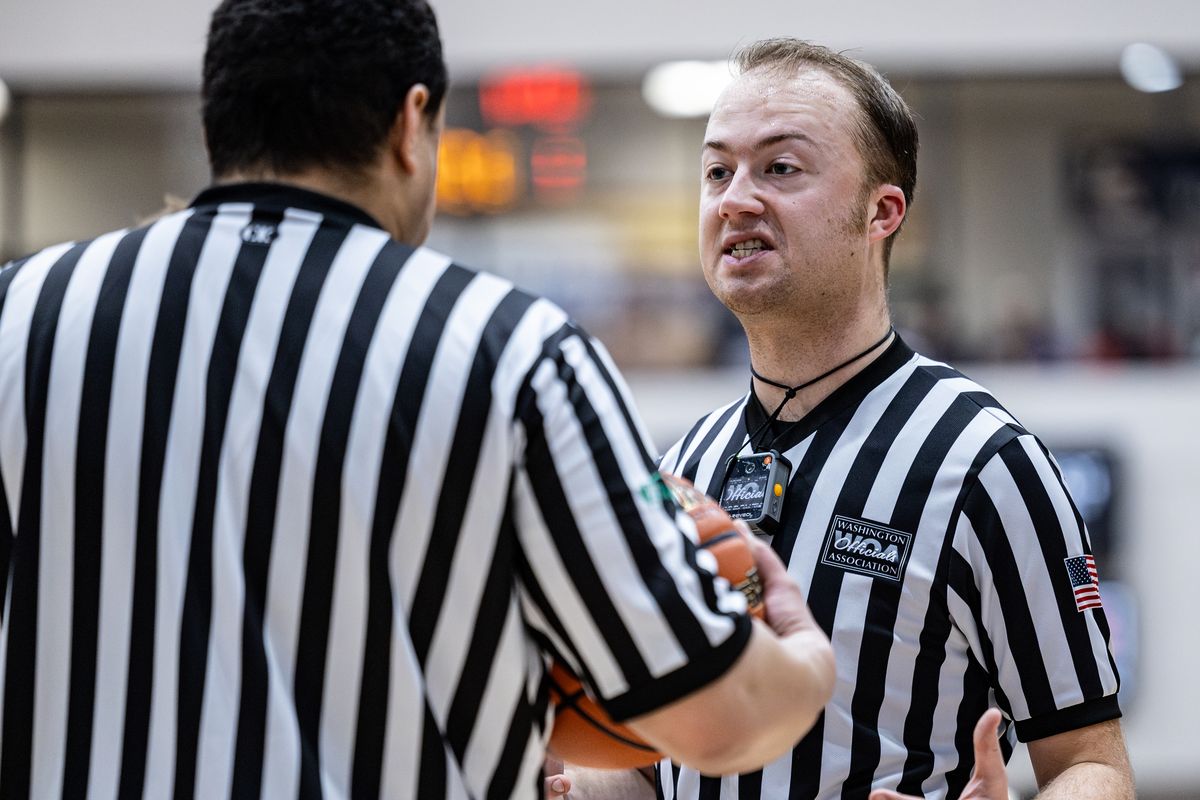Facing bigger tempers and more threats, some school sports referees in Washington now wear body cameras

With 3,500 screaming fans watching, basketball official Tim Lewis ran up and down the court. Secured to his chest was the latest tool designed to protect referees from abuse: a body camera.
“It’s a de-escalator more than anything else, right? The camera isn’t necessarily there to be like, ‘Oh, we’re gonna catch you in the act and get you in trouble,’ ” said Lewis, 29. “It’s more to go and be like, ‘Hey, this is how you’re behaving right now. You want to chill out a little bit, like, let’s talk human to human.’ ”
Last year, half of all sports officials in the United States felt threatened or feared for their safety, according to a national survey of 35,000 referees across all sports. Almost 70% of officials believe sportsmanship is getting worse, an 11 percentage point increase since 2017. About one in eight officials say they have been assaulted by a fan, coach or player.
“Initial indications are positive out of Washington, and we’re really excited for them to do a deep dive into the data after the school year when they can formalize some reports and see if sportsmanship has improved,” said Joe Jarosz, spokesperson for the National Association of Sports Officials, which conducted the study.
In Washington, state legislators have proposed stricter penalties for people who assault an official, on par with the penalties for assaulting a teacher or bus driver.
The bill, which the House debated and passed unanimously earlier this month, stalled in the Senate, and it appears unlikely the proposal will become law this year.
State first in country to wear body cams
Washington is the first state in the country to use body cameras to protect sports officials. Since Jan. 1, Lewis has been one of approximately 100 officials across Washington wearing a body cam during their basketball games.
Todd Stordahl, executive director of the Washington Officials Association, said the body camera idea arose from conversations with sports officials from Canada and the United Kingdom. Refs in those countries have reported success in implementing body cameras in adult recreational soccer matches.
Stordahl said Washington was in a unique position to be the first in the country to implement the use of body cameras because the officials govern themselves through the Washington Officials Association, while in most other states, the state associations overseeing school sports govern officials.
“We don’t shy away from being the first,” Stordahl said.
Washington officials are instructed to activate the camera in three types of situations: an unsporting technical, any action that could threaten the official’s safety, or discriminatory or harassing behavior by anyone in the gym, Stordahl said.
The camera includes a monitor that shows what it’s recording. The system does not record the whole game but records the 30 seconds prior to being activated.
Officials across all sports in Washington are continuing to see a troubling rise in incidents of abuse and assault.
In 2021, an ex-college basketball player ran from the stands and shoved a 72-year-old referee to the floor during a middle school basketball game in Kenmore, Washington. According to court records, the man broke the referee’s nose, cheekbone and two ribs.
This incident was an extreme case of abuse toward officials, but it is part of a broader problem, experts say. The man pleaded guilty to third-degree assault last month.
Not all referees support the use of body cameras.
Jim Jacobson, marketer and recruiter for Spokane Basketball Officials, the group that provides referees for high school and other games in Spokane, said he is concerned that the use of body cameras could hurt recruitment efforts.
“We’ve got a number of tools that we can use as an official to calm down a situation,” Jacobson said. “Warnings to the coach put it in the book, technical fouls, objections if we have to. I feel like we’ve got plenty. I just don’t feel like the body cam was the correct … the necessary step we had to go to.”
Jacobson said he is more concerned that people cannot keep their emotions in check during sporting events.
The addition of body cameras and legislation related to officials is in response to a broader decline in sportsmanship. During a 20-year soccer officiating career, Richard Meeks has been slapped and spat on during adult club games, and experienced a slew of verbal abuse from impassioned parents during youth games.
“I think unfortunately, when people see referees, they see a uniform, and they forget that there’s a person inside wearing that uniform,” Meeks said.
Stordahl said the goal is to protect officials without ruining the competitiveness and spectacle of high school sports.
“We don’t want to take the emotion out of the game. There’s gonna be emotion. You’re gonna disagree with the call. You’re gonna want to yell at the official,” Stordahl said. “But if we can keep that at a respectable level and not go too crazy, then I think the cameras will do their job.”